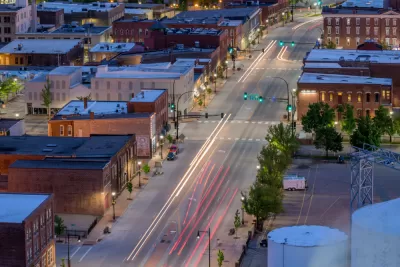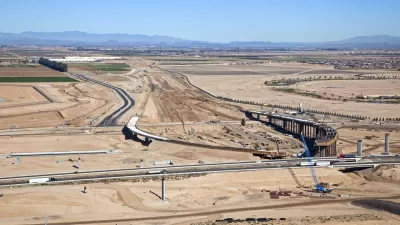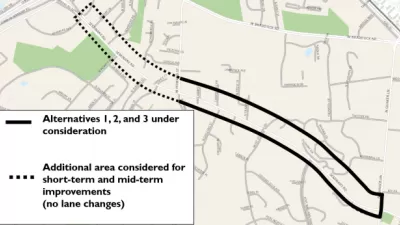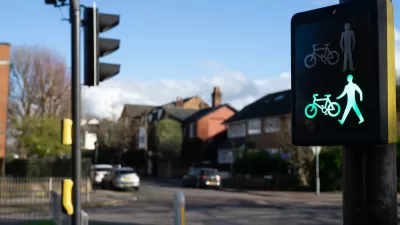The Federal Highway Administration (FHWA) released a report to Congress this week that takes initial steps toward making complete streets the default model for funding and designing federally controlled roads.

The Federal Highway Administration (FHWA) on Wednesday published a new report that adopts complete streets as the default approach for funding and designing the majority of federally funded roadways in the United States, according to an FHWA press release.
The "Moving to a Complete Streets Design Model: A Report to Congress on Opportunities and Challenges" report focuses on non-access-controlled roadways—i.e., not freeways, but urban arterials and small town main streets.
The Complete Streets design model will address rising traffic fatalities by implementing designs that reduce speeds, "making it a key component of FHWA’s implementation of the U.S. Department of Transportation’s National Roadway Safety Strategy," according to the press release.
To achieve its goals, the FHWA's complete streets program will focus on five opportunity areas:
- Improved data collection and analysis.
- Rigorous safety assessment during development and design.
- Accelerated adoption of standards and guidance.
- Reinforcing safety as a top priority.
- Complete streets as a default approach.
As noted in the press release, the Infrastructure Investment and Jobs Act (IIJA) approved by Congress at the end of 2021 also includes new priorities on Complete Streets, including a requirement that states and metropolitan planning organizations use at least 2.5 percent of their planning funding on activities related to Complete Streets or travel on foot, by bike, in a vehicle or using public transit. The IIJA "also continues to provide funding for Complete Streets activities through Rebuilding American Infrastructure with Sustainability and Equity (RAISE) grants and the National Highway Performance Program," adds the press release. "Surface Transportation Block Grant Program funds can also be used for Complete Streets implementation," and the FHWA also recently released guidance for the Highway Safety Improvement Program, which can be used for Complete Streets projects and received an additional $4 billion in funding, as documented by Planetizen in an article from November 2021.

Study: Maui’s Plan to Convert Vacation Rentals to Long-Term Housing Could Cause Nearly $1 Billion Economic Loss
The plan would reduce visitor accommodation by 25% resulting in 1,900 jobs lost.

Alabama: Trump Terminates Settlements for Black Communities Harmed By Raw Sewage
Trump deemed the landmark civil rights agreement “illegal DEI and environmental justice policy.”

Why Should We Subsidize Public Transportation?
Many public transit agencies face financial stress due to rising costs, declining fare revenue, and declining subsidies. Transit advocates must provide a strong business case for increasing public transit funding.

Paris Bike Boom Leads to Steep Drop in Air Pollution
The French city’s air quality has improved dramatically in the past 20 years, coinciding with a growth in cycling.

Why Housing Costs More to Build in California Than in Texas
Hard costs like labor and materials combined with ‘soft’ costs such as permitting make building in the San Francisco Bay Area almost three times as costly as in Texas cities.

San Diego County Sees a Rise in Urban Coyotes
San Diego County experiences a rise in urban coyotes, as sightings become prevalent throughout its urban neighbourhoods and surrounding areas.
Urban Design for Planners 1: Software Tools
This six-course series explores essential urban design concepts using open source software and equips planners with the tools they need to participate fully in the urban design process.
Planning for Universal Design
Learn the tools for implementing Universal Design in planning regulations.
Smith Gee Studio
Alamo Area Metropolitan Planning Organization
City of Santa Clarita
Institute for Housing and Urban Development Studies (IHS)
City of Grandview
Harvard GSD Executive Education
Toledo-Lucas County Plan Commissions
Salt Lake City
NYU Wagner Graduate School of Public Service





























